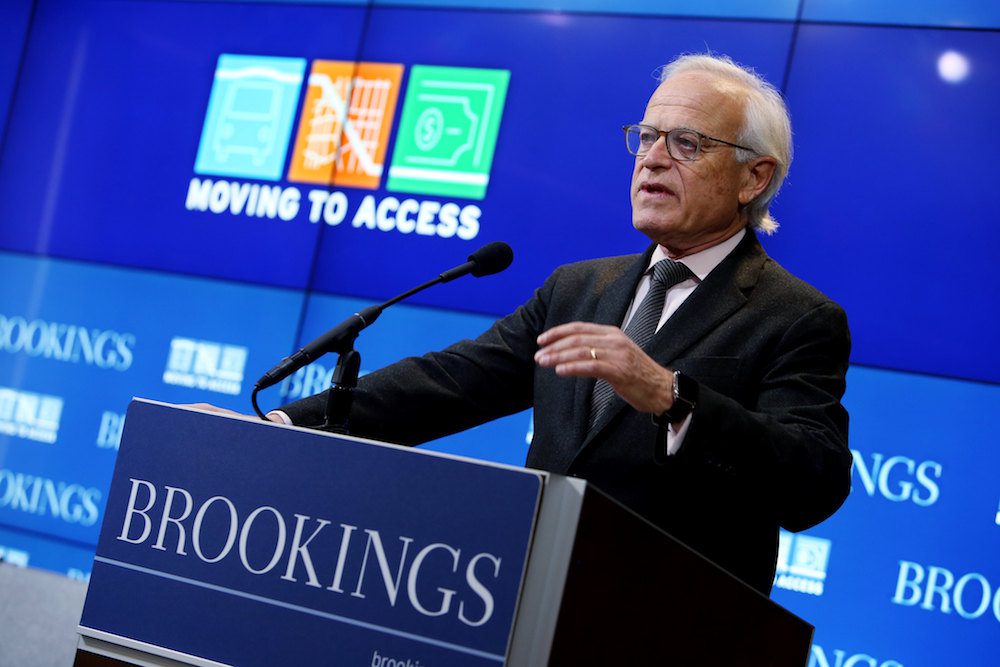Martin Indyk: An Important Neoliberal Defects From the Blob

Within the inner precincts of the American foreign policy establishment, last names are redundant. At a Washington cocktail party, when some half-sloshed AEI fellow whispers, “Apparently, Henry is back in Beijing to see Xi,” there’s no need to ask, “Which Henry?” In that world, there is only one Henry, at least only one who counts.
Similarly, there is only one Martin. While Martin Indyk may not equal Henry Kissinger in star power, he has for several decades been a major player in U.S. policy regarding Israel and the Middle East more broadly. Founder of the Washington Institute for Near East Policy, senior director on the National Security Council, twice U.S. ambassador to Israel, assistant secretary of state for Near East affairs, presidential envoy—not a bad resume for someone who was born in London, raised in Australia, and became a U.S. citizen only in his 40s.
Throughout his career, Martin has been deeply invested in the Israeli-Palestinian “peace process” and in the proposition that the United States has a vital interest in pursuing that process to a successful conclusion. More broadly, he has subscribed to the view that the United States has vital interests at stake in the Middle East more generally, with regional stability and the well-being of the people living there dependent on the United States exercising what people in Washington call “leadership.” In this context, of course, leadership tends to be a euphemism for the use or threatened use of military power.
These are, of course, establishment notions, to which all members of the “Blob” necessarily declare their fealty. Indeed, at least until Trump came along, to dissent from such views was to become ineligible for appointment to even a mid-level post in the State Department, the Pentagon, or the White House.
Yet Martin has now publicly recanted.
In an extraordinary op-ed published in the Wall Street Journal (of all places), he asserts that “few vital interests of the US continue to be at stake in the Middle East.” Policies centered on ensuring the free flow of Persian Gulf oil and the survival of Israel have become superfluous. “The US economy no longer relies on imported petroleum,” he correctly notes. “Fracking has turned the US into a net oil and natural-gas exporter.” As a consequence, Persian Gulf oil “is no longer a vital interest — that is, one worth fighting for. Difficult as it might be to get our heads around the idea, China and India need to be protecting the sea lanes between the Gulf and their ports, not the US Navy.”
As for the Jewish State, Martin notes, again correctly, that today Israel has the capacity “to defend itself by itself.” Notwithstanding the blustering threats regularly issued by Tehran, “it is today’s nuclear-armed Israel that has the means to crush Iran, not the other way around.”
Furthermore, Martin has had his fill of the peace process. “A two-state solution to the Palestinian problem is a vital Israeli interest, not a vital American one,” he writes, insisting that “it’s time to end the farce of putting forward American peace plans only to have one or both sides reject them.”
Martin does identify one vital U.S. interest in the Middle East: averting a nuclear arms race. Yet “we should be wary of those who would rush to battle stations,” he cautions. “Curbing Iran’s nuclear aspirations and ambitions for regional dominance will require assiduous American diplomacy, not war.”
That last sentence captures the essence of Martin’s overall conclusion: he proposes not disengaging from the Middle East but demilitarizing U.S. policy. “After the sacrifice of so many American lives, the waste of so much energy and money in quixotic efforts that ended up doing more harm than good,” he writes, “it is time for the US to find a way to escape the costly, demoralising cycle of crusades and retreats.”
Now such sentiments appear regularly in the pages of The American Conservative and on the website of the Quincy Institute for Responsible Statecraft. Yet in establishment circles, a willingness to describe U.S. policy in the Middle East as quixotic is rare indeed. As for acknowledging that we have done more harm than good, such commonsense views are usually regarded as beyond the pale.
Martin deserves our congratulations. We must hope that his heresy catches fire and spreads throughout the Blob. In the meantime, if he’s in need of office space, the Quincy Institute stands ready to help.
Welcome to the ranks of the truth tellers, comrade.
Andrew Bacevich is TAC’s writer-at-large and president of the Quincy Institute. His new book, The Age of Illusions: How America Squandered Its Cold War Victory, has just been published.
Comments